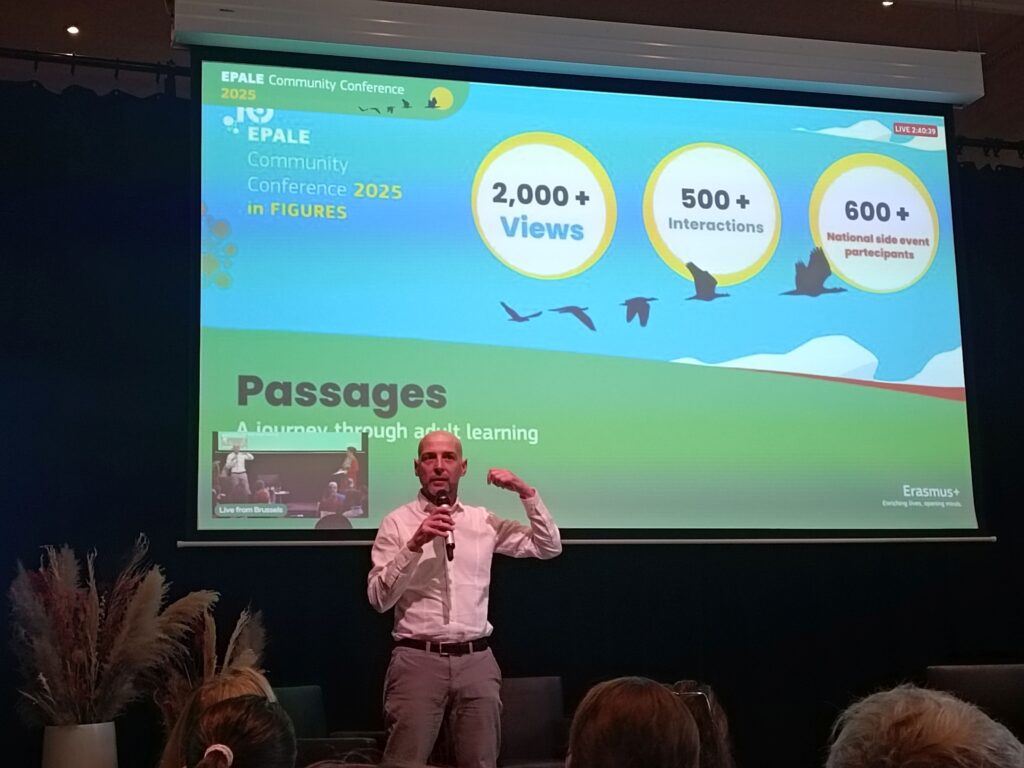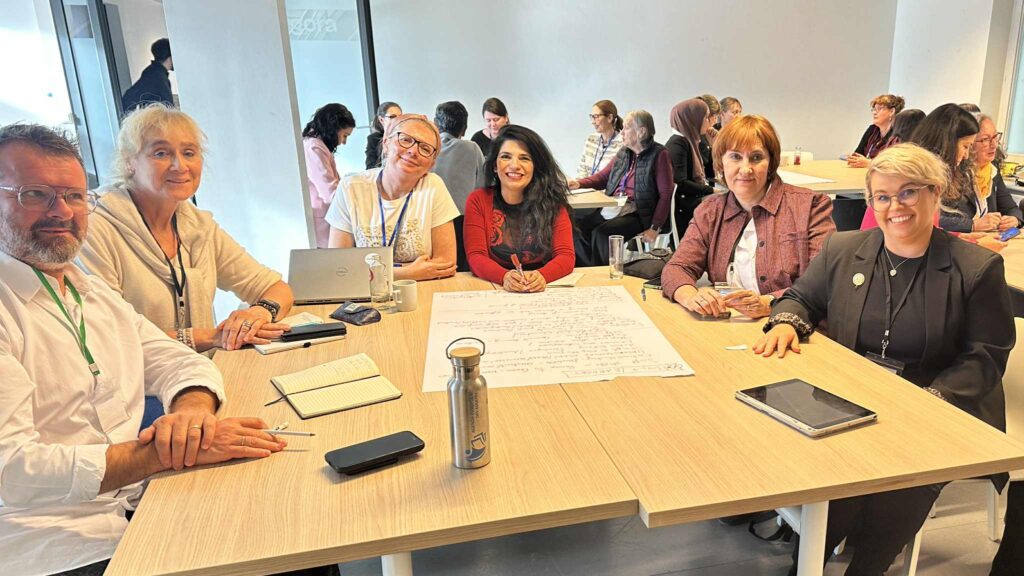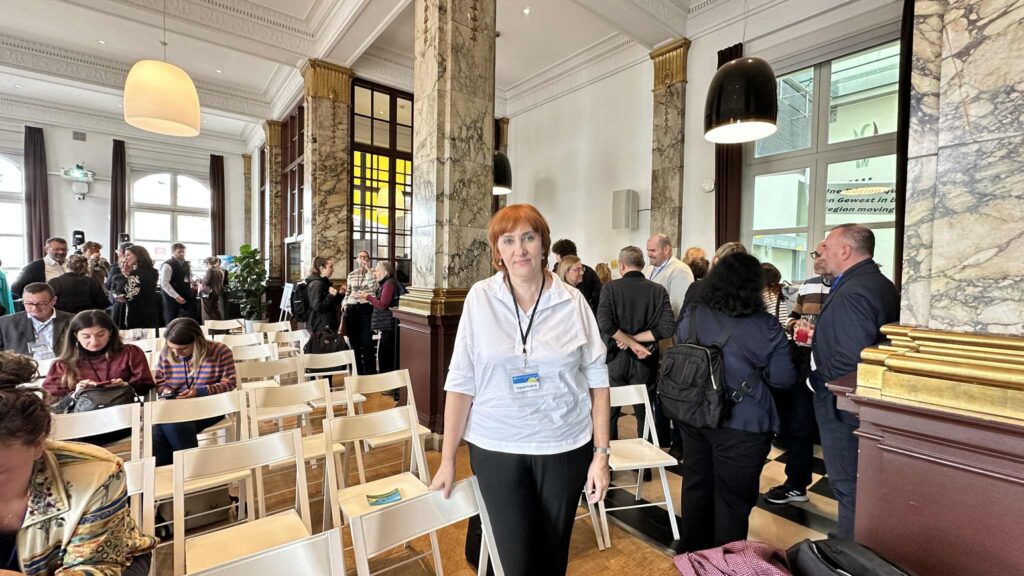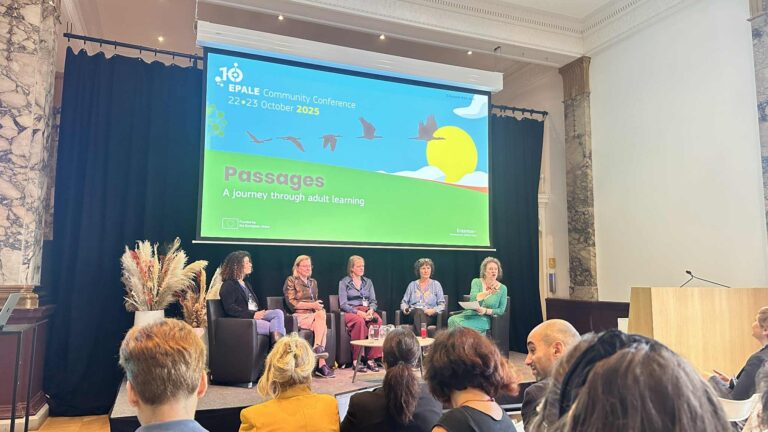On the 22nd–23rd of October, Coordinator of Adult Education Activities Virginija Švedienė participated in the EPALE (Electronic Platform for Adult Learning in Europe) Community Conference in Brussels, having been delegated by the Education Exchanges Support Foundation as one of the most active EPALE Lithuania users.
This year’s conference, dedicated to EPALE’s 10th anniversary, symbolically connected the past, present, and future, encouraging participants to reflect on the changes that have shaped adult education and will continue to influence it in the years to come. The first day focused on developments over the past decade – technological progress, increasing community engagement, and the growing importance of non-formal learning. The second day looked ahead, exploring how education can respond to rapid global change and become even more open and flexible.
Several key themes emerged during the conference. It was emphasized that adult learning is an essential part of social rights, helping to reduce skills gaps between regions and different social groups. The importance of stronger cooperation between traditional educational institutions and learning networks was underlined to ensure accessible, high-quality learning opportunities. It was also highlighted that technology should not be a goal in itself but rather a tool to foster inclusion, strengthen people’s abilities, and expand opportunities.
During the practical workshops, four closely interconnected areas of insight emerged, reflecting both the present and future of adult education. First, it was stressed that learning must be tailored to each individual, taking into account their linguistic, cultural, and social context. Achieving this requires flexible methods, strong partnerships, and non-traditional learning formats that effectively reach diverse learners. A great deal of attention was given to empathy and inclusion –creating learning environments that encourage open dialogue, support problem-solving, strengthen language skills, and reduce stigmatization through flexible assessment approaches. The importance of future skills was also underlined: critical thinking, adaptability, collaboration, and maintaining motivation are key to ongoing personal and professional growth.
Equally significant was the role of artificial intelligence in education. As technology reshapes learning environments, it is crucial to ensure its responsible integration, uphold ethical standards, strengthen local expertise, and foster critical thinking so that AI becomes a supportive tool rather than an end in itself. All these elements together create a more inclusive, resilient, and future-oriented adult learning landscape.
Virginija chose to participate in the group discussion focused on future skills, a topic closely tied to her everyday work. She works with adult learners who actively engage in self-directed learning – exploring literature, learning languages, and broadening their horizons. Virginija considers language learning to be one of the most important future skills: it builds confidence, enables access to and understanding of diverse information sources, develops critical thinking, fosters intercultural communities, and cultivates respect for others.
The conference was an invaluable experience for Virginija, offering the opportunity to meet colleagues from across Europe, discuss current educational challenges, share experiences, and collectively search for solutions. Being part of the EPALE community is especially meaningful – it provides a space to both gain inspiration and share the results of one’s own work.
It is also important to note that the voices of adult learners are often heard in society through the work of educators – through articles, podcasts, and other initiatives. Lifelong learning is not just an opportunity for older adults; it begins in early childhood and continues as long as a person remains curious, open to new ideas, and capable of critical thinking. This belief lies at the heart of Virginija’s personal and professional journey.
Equally important is the role of libraries in adult education today. They serve not only as reliable sources of information but also as vibrant community hubs. Libraries have both human and informational resources to help people find answers, bring communities together, and create meaningful learning experiences. They are places where learning becomes accessible, dynamic, and empowering.
Virginija Švedienė
Coordinator of Adult Education Activities







